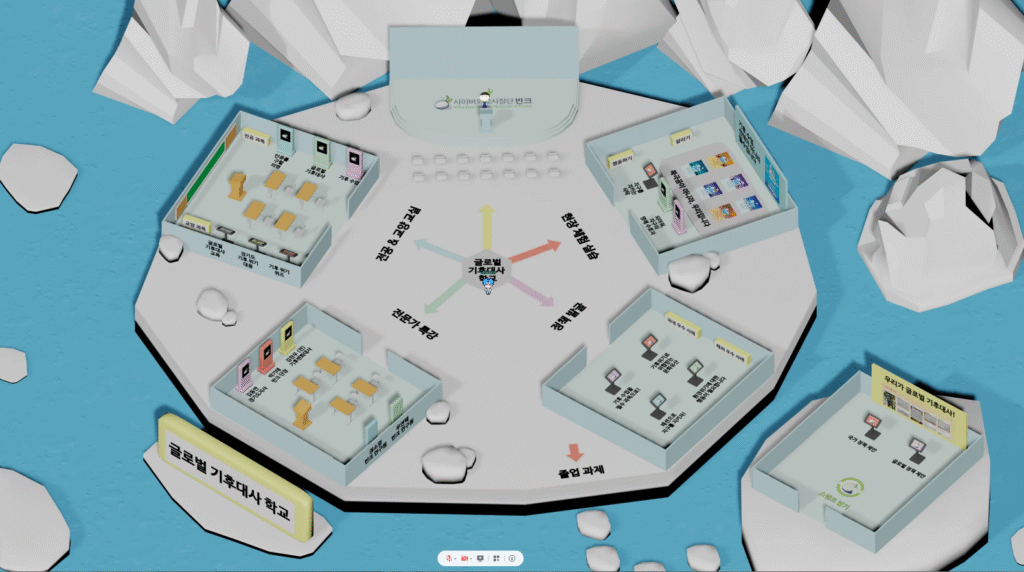
VANK has established the “Global Climate Ambassador School” on the domestic leading metaverse platform ZEP, inspired by historical Korean general Yulgok Yi I’s strategy to train 100,000 soldiers. The school aims to cultivate 100,000 climate ambassadors worldwide to actively respond to the global climate crisis.
ZEP is a prominent South Korean metaverse platform accessible via mobile phones, tablets, and computers, enabling users across the globe to interact beyond physical boundaries and engage with diverse features in a virtual environment.
VANK emphasized that “the climate crisis is no longer just a problem for polar bears but a critical survival issue for our generation.” To tackle this most urgent threat facing humanity today, the organization created the Global Climate Ambassador School to nurture youth climate defenders who can devise and advocate effective climate policies.
VANK has previously built various virtual exhibition halls introducing Korean history and culture in the metaverse, such as the ‘Korean Hallyu Stars in History Exhibition,’ the ‘Dokdo Exhibition Hall’ showcasing the Korean territorial islets, the ‘Foreign Independence Activists Exhibition,’ the ‘Teen Independence Activists Exhibition’ highlighting lesser-known youth heroes, the ‘VANK 20th Anniversary Exhibition,’ and the ‘Overseas Korean Exhibition’ celebrating the contributions of 7 million Koreans abroad.
The newly launched Global Climate Ambassador School symbolizes Korea’s leadership in global culture—akin to Korean pop culture’s worldwide influence and a Korean author winning the Nobel Prize in Literature. Here, Korean youth transcend time and space in a virtual realm, embracing the mindset of ‘soldiers who save themselves, their country, and humanity.’ They plan and propose policies to confront the climate emergency, a challenge that even international organizations like the UN struggle to resolve, aiming to protect the endangered Earth while spreading Korea’s climate action efforts globally.
Within the metaverse narrative, a polar bear drifts to Korea on melting icebergs pleading desperately for help: “Please enroll in the Climate Ambassador School and save the polar bears and humanity from the climate crisis!” Responding to this call, youth worldwide join the school.
Situated in the metaverse near Korea’s East Sea on a melting iceberg, the school’s design symbolizes the immediacy of the climate crisis—it is not just a polar bear’s problem but a generational challenge. The melting ice reflects the peril faced by both polar bears and the youth who represent the future.
The school consists of five virtual classrooms:
- Major & Elective Classroom: Contains essential courses such as “From Soldiers Protecting the Nation to Soldiers Saving Humanity!”, “We Are Global Climate Ambassadors!”, and “Climate Classes: Now Mandatory, Not Optional!” These videos persuasively explain why climate education must be compulsory in schools and the critical need for sound climate policies.
- Elective Section: Includes engaging resources like the VANK Climate Ambassador Education Site, Gyeonggi Province Climate Crisis Response Site, and Climate Crisis Quizzes, helping ambassadors approach the topic playfully yet seriously.
- Expert Lecture Room: Features encouragement from Gyeonggi Province Governor Kim Dong-yeon; talks from VANK Director Park Ki-tae on the “Great Challenge of Global Climate Ambassadors”; former Foreign Ministry Climate Ambassador and ex-Brazilian Ambassador Kim Chan-woo on “Climate Change, a Serious Threat to Humanity”; and presentations by VANK researchers Woo Yeon-taek and Kwon So-young on VANK’s climate action case studies.
- Field Experience Practice Room: Allows participants to explore climate crisis posters such as “It’s Us, Not the Polar Bears,” “Become Earth’s Honorary Guardians,” and “Climate Classes Are Not Optional!” They can also engage with a knowledge platform promoting eco-friendly eating habits and certify their practice.
- Policy Discovery Room: Introduces exemplary policies for the graduation project, divided into domestic best practices like making climate education mandatory and protecting cultural heritage threatened by climate change, and international initiatives like “Protecting the Earth Through Fashion” and “Taking Action for the Planet.”
In the Graduation Project, climate ambassadors propose their own climate crisis policies via the national policy proposal platform ‘Woollim’ and the global policy platform ‘Bridge Asia,’ preparing them to respond effectively to urgent climate warnings and equipping future generations with the tools to save their country and the world.
VANK plans to require its volunteer global climate ambassadors worldwide to visit the school monthly, promoting Korea’s youth-led climate initiatives and policy proposals internationally.
Park Ki-tae, Director of VANK, stated, “Despite climate action no longer being optional but essential, Korean government policies and systems have yet to fully reflect this urgency. Through the 21st-century ‘climate soldiers’—our global climate ambassadors—we aim to broadcast Korea’s climate responses worldwide. We hope to nurture all Korean youth into global climate ambassadors and see Korea lead the international community in climate action.”
Youth Researcher Seong Hye-seung added, “Since the climate crisis is more lethal for future generations, everyone must share responsibility to overcome it. Climate ambassador activities are a starting point for this change, where young people raise their voices and take action to build a sustainable future and join the global journey to protect the Earth.”
Meanwhile, VANK has partnered with Gyeonggi Province (Governor Kim Dong-yeon) to foster global climate ambassadors. Their cooperation covers developing content on climate crisis severity and responses, expanding online and offline climate education and action for youth, and internationally promoting Gyeonggi’s climate policies through social media.